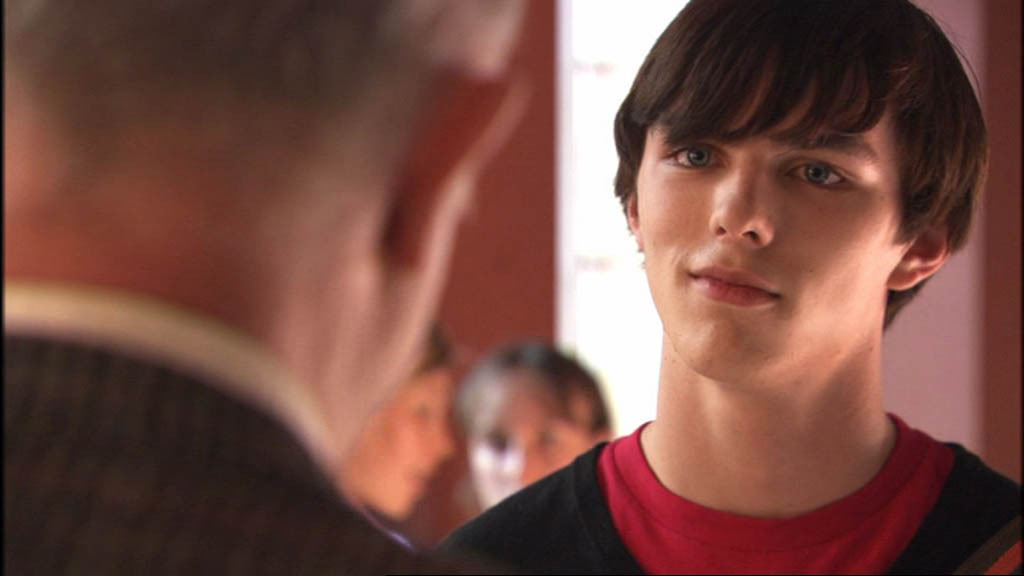Skins: Season One, "Sid" and "Maxxie and Anwar"
“Wake up, Sid!”-Cassie
Sid (Mike Bailey) is essentially a sidekick. In a more
traditional story, his inner life would be of little interest to us. But, then
again, in a more traditional story Tony wouldn’t be a cataclysmic asshole.
"Sid" finds us once again reassessing our preconceived notions
about a character. In essence, the episode suggests what would happen if the
sidekick were the main character. Now, no single character is technically the
central character of Skins, but the
show clearly has a weak spot for the characters of Tony, Michelle, and Sid (and
Cassie as far as she relates to their story). And, for better and for worse,
Tony is the closest thing to a central character the show has.
We already like and sympathize with Sid, but by placing us
so fully in his perspective the character comes into sharper relief. Not that we didn’t already feel for him, but Sid has existed as much for
comic relief as poignant angst.
Here it crystallizes as to why Sid is such a malleable,
unmotivated loser. To his parents he’s a disappointment and to his friends he’s
a plaything, a fuck up, or pitiable little brother. He’s a pathetic figure, and
he desperately needs to self-actualize.
But the entire episode finds him deeply oblivious to what’s
going on around him. He misses that his parents are on the verge of divorce. He
doesn’t catch on to the devious manipulations of Tony. He fails to pick up on
the feelings Cassie expresses.
Sid will eventually realize all of these things, but only after
it’s too late to do anything about them and he leaves a dramatic wreckage
behind. The episode ends with him attempting to do one thing right; it’s just
an essay (well, not just an essay but
rather the necessary grade not to get kicked out of school) but it’s finally
something he can choose not to screw up and get right. It’s a surprisingly affecting
moment for what amounts to someone staring at a computer in a montage.
We like to think that we’re the protagonist of our life’s
story. But we’re also the supporting character in the lives of other people,
and we tend to forget this. At its best, Skins
suggests that every person has their value. Every person is going through their
own issues and struggles, and we will never fully know the experiences of the
people in our lives. We’re too caught up in seeing ourselves as the hero, but
we’re also the sidekick and being the sidekick is rough.
Series One, Episode
Six, “Maxxie and Anwar”
And then there’s Skins
at its worst …
*Sigh*
“Maxxie and Anwar” is infamous amongst fans of Skins. It’s gone down as part of the
show’s lore as “The Russian Episode”. It isn’t just bad; it’s epically bad.
But, moreover, it’s a massive miscalculation. It’s an episode that features all
the distasteful and questionable elements of
Skins and almost next to none of the redeeming ones.
The episode transplants its ensemble on a fieldtrip to
Russia … and, um, things happen. Even by Skins’s
standards, the plot is a scatterbrained mess. For an episode that claims to be primarily
interested in Anwar (Dev Patel), Maxxie (Mitch Hewer) and their friendship, the
episode spends most of its time doing everything but exploring that
relationship.
Where do we even begin with what doesn’t work: Awful Russian
stereotypes abound, Anwar is mistaken for a terrorist, Sid acts as a drug mule,
and Chris and Angie sleep together.
But the most pressing problem is how this is all done at the
expense of one of Skins most riveting
and devastating stories. Anwar and Maxxie are best friends. Anwar is a Muslim
and Maxxie is gay; Anwar’s religious beliefs cause him to break off his
friendship with Maxxie. It’s some of the most powerful and raw material the
series will ever craft, and it’s buried deep amongst a barrage of offensive
jokes and odious sex scenes.
Part of me wants to believe that the emotionally raw nature
of the subject matter caused the writers to surround it among sillier and more
nonsensical elements to make it more palatable. On some level, Skins is always doing this. It will
confront a complicated, charged subject matter and then be so flippant about it
that it can always cop-out if it needs to justify itself: “We’re just a
television show, guys. We’re just here to entertain”
But usually there’s a certain level of dignity to Skins’s narratives. This episode seems
to confirm a lot of the criticisms that Skins
often finds lobbed at it: that it’s crass, unrealistic, and that it
romanticizes certain questionable behaviors and actions. A few of the earlier
episodes generated enough goodwill that I was willing to stick with the series,
but it’s easy to see how someone might think that any of the series’ latent
promise was merely a fluke.
Grade: C-
Stray Observations:
-A note about the grade for “Maxxie and Anwar”: The scenes
between Anwar and Maxxie are an A or A-, but everything else is somewhere in
the D-range. So the difference has been split.
-Sid: “Michelle would not … would not fuck a horse”
-Sid’s father is played by the always welcome Peter Capaldi.
Capaldi’s best scene has to be the one where he tells Sid that he wishes he
were more like Tony. I had friends whose parents acted like that. But it’s
especially sad and frustrating because we know that anyone should rather have a
kid like Sid over one like Tony.
-All of Michelle’s self-justifying in order to accept Tony’s
infidelity and general awfulness is heartbreaking. This and a number of other
plot beats could feel like wheel-spinning but they don’t because of the
storytelling structure distributing them sparsely.
-The crosscutting between Sid and Michelle’s dance and
Cassie’s overdose is one of those instances where the show’s grand melodrama matches
its visual scheme. There is the tiniest hints of Douglas Sirk to Skins (in so far as there is the hint of
Sirk in all melodrama). For instance, the show finds people playing out
expected social roles only to find themselves limited and frustrated. It also
tries to overwhelm its viewers with its excessive, emotionally florid
narratives.
-Sometimes Skins’s
structure can be frustrating because it denies us access to certain characters.
But sometimes it self-consciously and superbly reminds us of the limitations
that come with following a particular character. One of these moments comes in
Sid’s episode, where Jal yells at Sid forgetting his date plans with Cassie. It’s
easy to imagine a whole story occurring just outside the episode with Cassie nervously
pining for Sid and going to Jal for advice. And because of what we’ve learned
about Jal and Cassie in their episodes, it makes those moments even sharper. Skins continues to use its history to be
subtler and bolder. It’s crafted a shorthand where it can give brief glimpses
of a character and tell us so much about them and their larger story.
-Tony’s manipulation reaches it pinnacle in Sid’s episode.
First with the choir scene and later when he convinces Sid to pursue Michelle,
only to win her back. It’s ugly stuff and the show doesn’t try to pretend it
isn’t.
-What are we to make of Tony’s attempts to sleep with
Maxxie? I don’t think Tony is gay or even bi. A little too often Tony barely
comes off like a real human being.
-Another reason the Russia episode is so disappointing is
because it’s centered on two of the more underserviced characters. Anwar, on
paper, is one of the most fascinating characters. It’s such a unique choice to
feature a character who is Pakistani and Muslim, and there was so much potential
for that character but it gets largely squandered (especially as it relates to
him trying to be an average teen while being a faithful Muslim – We get a brief
look at that when Maxxie calls him a hypocrite).
-Skins is very,
very, very loosely about what it means to grow up in a post-9/11 world. One
notable (though so poorly handled) instance of this comes when Anwar is
harassed at airport security because he’s Pakistani.
-“Maxxie and Anwar” isn’t the only episode whose focus is on
more than one character. It’s rarely one of the show’s best storytelling modes
(although there are exceptions).
- “Really, Skins?” (Stupid Things Skins Did): The Russian episode pretty much qualifies in its entirety for this status.
- “Really, Skins?” (Stupid Things Skins Did): The Russian episode pretty much qualifies in its entirety for this status.







